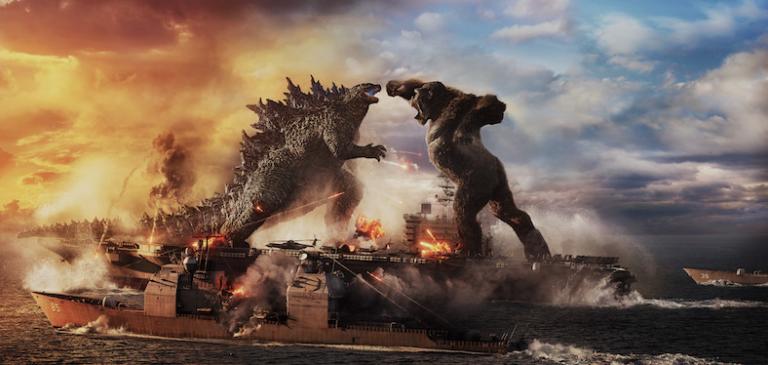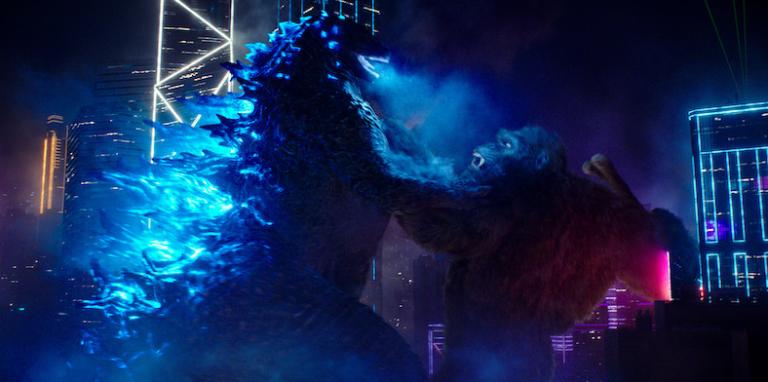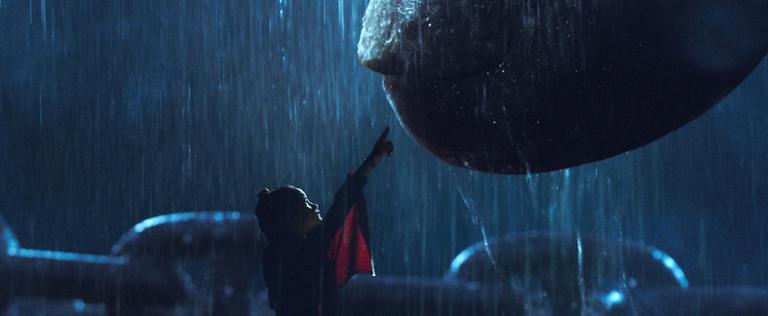
Godzilla vs. Kong isn’t a great work of art. It’s not even a great movie. But it does feature two great big monsters, and everything else—both in scale and in plotting—is really beside the point. And that, in a way, is the point. If there’s one thing the movie makes abundantly clear, it’s that these titans don’t like it when we humans get uppity.
Titan, by the way, is the generic name such massive creatures are being called here. (Kaiju was just not good enough, I guess.) Godzilla is a titan who generally lives under water and five years ago saved the world from the three-headed King Ghidorah. Kong, another titan, begins the movie still hanging out on Skull Island in his very own high-tech bio-preserve.
Oh, and they’re both roughly the same size now—even though in their most recent stand-alone movies, Kong was roughly a third the size of Godzilla (104 feet vs. 328 feet, according to Wired.) Now they’re both nearly 400 feet tall.
They also hate each other—or so cave paintings and the movie’s experts tell us. Kong and Godzilla are the Alabama/Clemson rivalry of the titanic primeval world, locking horns (though neither of them actually has horns) every time they see one another. And no spoiler to say they see each other plenty here.
But the movie’s title is a little misleading. And to learn why, we’re going to dive into some spoilers. (Consider yourself warned.)

The real villain here isn’t Kong or Godzilla, but rather a massive robot called Mechagodzilla—the behemoth brainchild of Walter Simmons, CEO of Apex Cybernetics (and played by Demián Bichir). As Madison Russell (Millie Bobby Brown), Godzilla’s favorite teen, says, Simmons is trying to replace Godzilla. How’s that for gratitude?
Simmons is the bad guy, but you can understand why. In a world of wildcards, Godzilla and other titans are literally gigantic ones. Sure, Godzilla saved the world from King Ghidorah, but what’s to stop him from paying a destructive visit to Philadelphia, just for kicks? Nothing, that’s what.
But Simmons also wants humanity to be at the “apex” of creation: He’s tired of these massive critters getting all the press. And, oh, by the way, if he owns and controls the biggest titan on the planet, he’s probably got a leg up on any discomforting business negotiations, too.
Godzilla, though, somehow knows what Simmons is up to. The whole movie begins with the big lizard taking down Apex’s Pensacola operations—to stop Simmons’ project in its tracks.
Naturally, it reminded me of the Tower of Babel.
Stay with me: The stories are more similar than you might think. In Genesis 11, we read about man’s first architectural push into the territory of God.
Then they said, “Come, let us build ourselves a city and a tower with its top in the heavens, and let us make a name for ourselves, lest we be dispersed over the face of the whole earth.” (Gen. 11:4, ESV)
God didn’t like that, so He gave the human race—which, until then, had enjoyed one common language—a plethora of tongues, so that no one could understand what another was saying. That was the end of this monumental building project, according to the Bible—but not the end of humanity’s desire to reach the heavens with their own power.

You could argue this began way back in the Garden of Eden, when Adam and Eve were promised god-like knowledge by taking a little nibble of fruit. The Bible is filled with stories of how those who humble themselves before God are raised, and those who think they’re all that are humbled (and often humiliated).
It’s a big theme in other storytelling arenas, too. In Greek mythology, Icarus crashed to earth for flying too close to the sun. In Mary Shelley’s Frankenstein, the not-so-good doctor tries to create life from a bunch of dead body parts and a bit of electricity—infringing on God’s sacred territory. In Titanic, the headlining boat was called “unsinkable,” which really is just tempting fate. A good many superhero movies feature villains who want, or claim, to be like a god—and they need someone just as powerful but a little more humble to cut them down to size.
In many stories—even stories that feature 400-foot-tall monsters—hubris is the biggest monster of them all. And stories that warn us of hubris—where characters want to become as gods themselves—always come with a hint of spirituality.
Godzilla vs. Kong is obviously not a Christian movie. Here, the titans are the gods: We are to them as ants, but they’re still loved and almost worshipped as protectors. They, like many mythological gods of old, can be unpredictable and jealous. And we even see a small hint of a more Christian-style element, when one of these titans steps into the brink and shows a willingness to sacrifice himself for someone far weaker than himself, but someone who loves him.
I don’t want to go too far down this road. Godzilla vs. Kong is pretty much what we think it is: a fun, shallow, CGI spectacle. But even such movies can carry just a whiff of a lesson if we look hard enough. Here, our Godzilla is a jealous Godzilla—and that serves as a faint reminder that our God is a jealous God. And we’re at our best not when we exalt ourselves, but when we humble ourselves. Our constructs of hubris, be they towers of Babel or Mechagodzillas, almost always come to bad ends.












